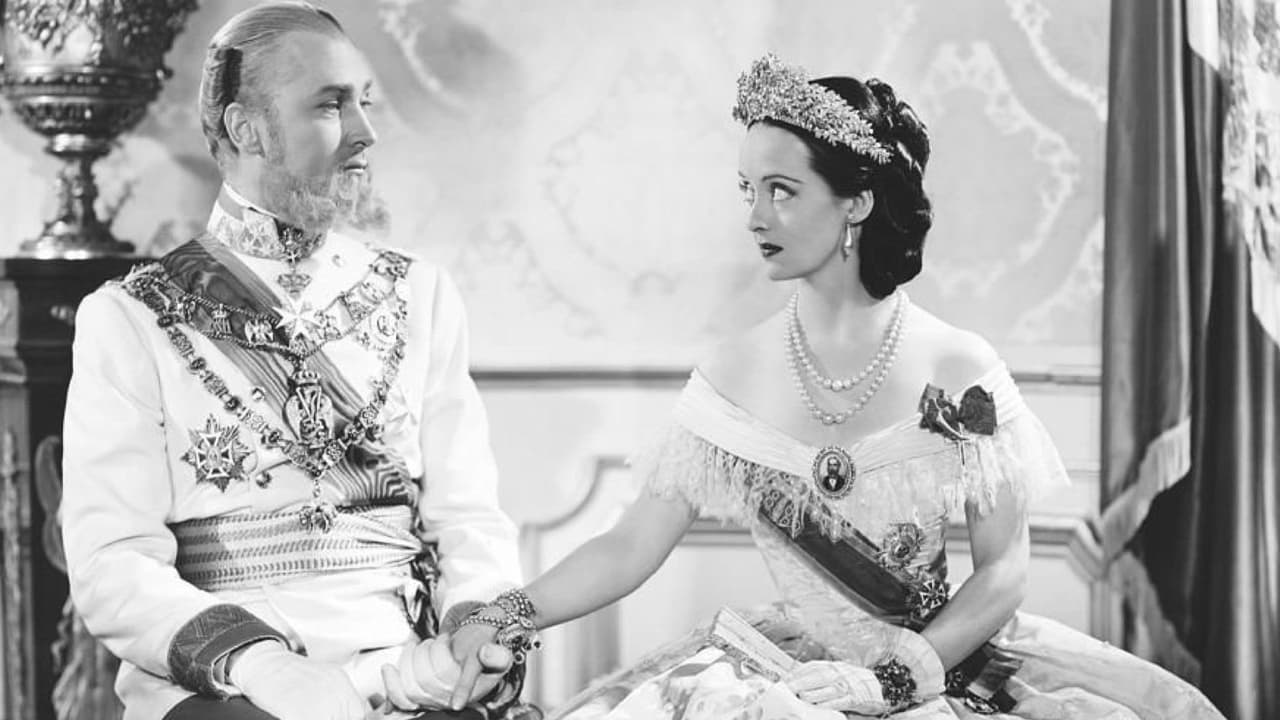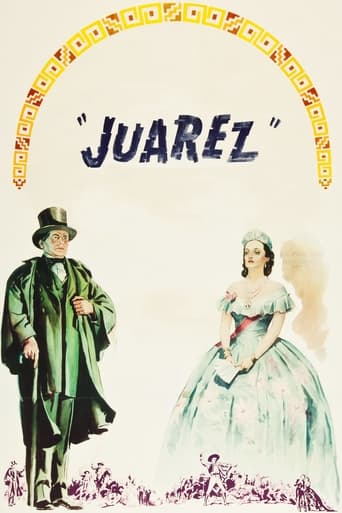



Save your money for something good and enjoyable
Purely Joyful Movie!
This story has more twists and turns than a second-rate soap opera.
View MoreThis is a gorgeous movie made by a gorgeous spirit.
View MoreIf blood is to be spilled then the reason for it must be extraordinary and not just to replace one rotten system of power with another of the same.If changes are made for the individual freedom of the people, it doesn't matter by whom or how, especially if no blood has to be spilled.Juarez is given the possibility of such changes by Maximilian but refuses them for his extremely blurred opinion of democracy, which he believes can come about by a representative democracy (I don't believe he did even know about the direct democracy). Had he accepted, Mexico may have become like Sweden but more prosperous, since Maximilian, from all that we know, was certainly better than the Swedish kings of the same time. This only goes to show that when somebody talks blurry, it's important to ask the practical and impertinent questions.
View MoreIn 1863, with the Civil War in America nearly won by the North and the Monroe Doctrine about to be imposed, French Emperor Napoleon III realizes he can't overtake Mexico by force and decides to establish a Monarch in the country--much to the dismay of the Mexican people and their president, Benito Juarez, who realize it's a puppet dictatorship. Although the film (based in part on a play from Franz Werfel and also the novel "The Phantom Crown" by Bertita Harding) is satisfactory on an artistic level, it is emotionally hollow. Paul Muni's top-billed performance as Juarez, a man of few words, is nearly swallowed up by the work of his co-stars, all performing at scenery-chewing level. Indeed, much of the dramatic focus is on Brian Aherne and Bette Davis as the Emperor and Empress Hapsburg, who are the pawns in the political game, one that ultimately drives Bette's Empress mad (in scenes verging on self-parody). The picture isn't involving as dramatic entertainment, yet as a cinematic history lesson it has some merit, and Aherne was nominated for a Supporting Actor Oscar. ** from ****
View MoreFrom "Pancho Villa Starring Himself" to "The Mexican" and the execrable "Man on Fire" (produced by an Englishman, from an Italian script loosely based on an incident in Columbia... reset in Mexico), Hollywood has never made a film about Mexico that doesn't fall back on clichés and cartoonish "gringo-centric" stereotypes. Despite some problems, Juarez is an honorable exception.The problem with the screenplay is that Bettina Harding bought the romantic, Euro-centric notion of Max and Carlotta as figures in a "tragic romance". They were patsies for Napoleon III's global ambitions (something the film does very well), but everyone in Mexico knows the two were complete fools who destroyed the economy, and hardly the loving couple depicted in the movie. Max was a syphilitic, pretentious twit. He neglected Carlotta (the "Casa Obvio", his summer house in Cuernavaca that he built, "forgetting" to include rooms for Carlotta is a popular tourist attraction now, and a botanical museum), had a son by his mistress, "la Bonita India" and -- infected his wife.The other reviewer is unintentionally misleading when he writes that Carlotta lived in seclusion for 60 years. She was bed-ridden most of the time, suffering tertiary syphilis, requiring round-the-clock medical care. She did indeed, like in the film, go bonkers -- but in the Vatican, not in a French palace. The Papacy was a major player in the geo-politics surrounding the Mexican adventure, but the film (perhaps wisely) simplifies the politics. But, what the hey -- it's Hollywood! It has the perfect cast for this kind of epic: who better to play stoic, long-suffering historical figures than Paul Muni? Who does devious Europeans better than Claude Raines and Donald Crisp? I really enjoy seeing Porfirio Diaz (who later seized the Mexican presidency in a coup, and maintained control for close to 35 years -- and is now a mixed figure in Mexican history, sort of like Lenin with the Russians, or Ataturk among the Turks) played by John Garfield. And who better to go completely bonkers and chew up the scenery than Bette Davis? By all means, watch the movie, but then read your Mexican history.
View MoreThe plot of this film devotes more time to the character of Emperor Maximilian than it does the title character of Juarez. There is no development of the character of Juarezwho he was, where he came from, or how he got to the point where the plot begins.It seems as if this film was planned as an all-star vehicle, ensemble cast, somewhat like more modern films such as "Airport", "Towering Inferno" and "Poseidon Adventure". All members of the cast are reputable, capable well-known actors, each of whom has little tidbits of plot throughout the film.Some other reviewers have said that certain actors were miscast in their roles, but since each part is so small, does it really matter? As for other remarks about the omission of Latino actors in this film, that is incorrect as there were several, most notably Gilbert Roland. Check the IMDb complete cast listing and see for yourself. Keep in mind that the story mostly concerns characters of European descent, so you wouldn't be seeing the typical Mexican in the main roles. As for the comments about the lack of battle scenes, the plot is about intrigue, not the war.I think viewing this movie is a worthwhile expenditure of time, just to see so many good actors in one film.
View More